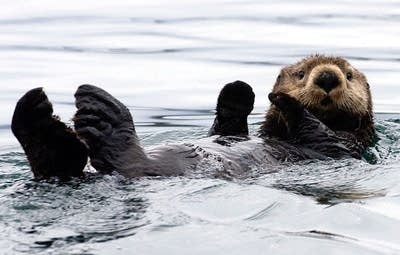Which endangered species will survive conservation triage?
Go Deeper.
Create an account or log in to save stories.
Like this?
Thanks for liking this story! We have added it to a list of your favorite stories.

As money and manpower run low, scientists are beginning to acknowledge that not all critically endangered species can or should be saved.
"That's a truth that many conservationists and many of the rest of us have been reluctant to acknowledge," said Michelle Nijhuis, a science journalist and former Alicia Patterson Foundation Fellow, on The Daily Circuit Tuesday. "Even in our existing system we practice a form of triage by simply not funding recovery efforts for species that we don't think we can afford to save. Many conservationists are saying, 'Look, it would be much better if we had a more explicit, more rational system for making these decisions.'"
In the current protection system for existing species, government officials already have some control over what species to focus attention, said Holly Doremus, co-director of the California Center for Environmental Law and Policy and a professor of law at the University of California-Berkley, on The Daily Circuit.
"Under the Endangered Species Act, the National Marine Fisheries Service and the Fish and Wildlife Service are supposed to list any species that is in danger of extinction or likely to become so in the foreseeable future," she said. "There are more species that qualify for those designations than the agencies can deal with, so they're setting priorities about which ones to deal with first. Then once species are listed, they also need to set priorities about what they fund, what kind of recovery efforts are undertaken on the public dime."
Turn Up Your Support
MPR News helps you turn down the noise and build shared understanding. Turn up your support for this public resource and keep trusted journalism accessible to all.
As conservation efforts become lost causes or too costly to continue, there could be more attempts in the future to take species off the list, essentially forcing the species to fend for itself, Doremus said.
On the private side of the funding debate, Nijhuis said funding tends to go to species she called charismatic megafauna.
"We do have a bias toward cute, cuddly animals, animals with eyebrows, animals that remind us of ourselves," she said. "A lot of conservationists will acknowledge that those charismatic megafauna are always going to be the species that will help them fundraise, it will help them inspire people. So I think there's an understanding of that conflict and there's also an acknowledgement that that conflict will always be there at some level."
So how will conservationists pick the species to save during the environmental triage in the coming years? The theories vary.
"Scientists have proposed that we look at the function of species within the ecosystem, these so-called keystone species that in some sense keep the structure of the ecosystem standing," Nijhuis said. "For instance, gray wolves in Yellowstone have effects on all sorts of other parts of the ecosystem."
There are also plans to try and preserve overall genetic diversity on the planet or in particular ecosystems.
For some species, it might be too late. Nijhuis said the rock hopper penguin off the coast of Antarctica is one species on the verge of letting go.
"Many species are threatened by climate change and there's a concern that some species may be too far gone in some sense to save, that there may be forces that are too broad, too far along and that species is essentially a lost cause," she said.
On Facebook, Amy J. Loiselle said there is one crucial element left out of this conversation: the impact of humans on other species.
"In all the conversations about species extinction there is hardly ever any mention of the continued impact of human population growth on the environmental problems we face," she wrote. "This is driving extinction, climate change, poverty etc. All the other 'causes' are directly related to increases in human numbers. Without solving this problem there is no foreseeable way to solve any of these other problem."
Join the conversation on Facebook. Madelyn Mahon contributed to this report.



